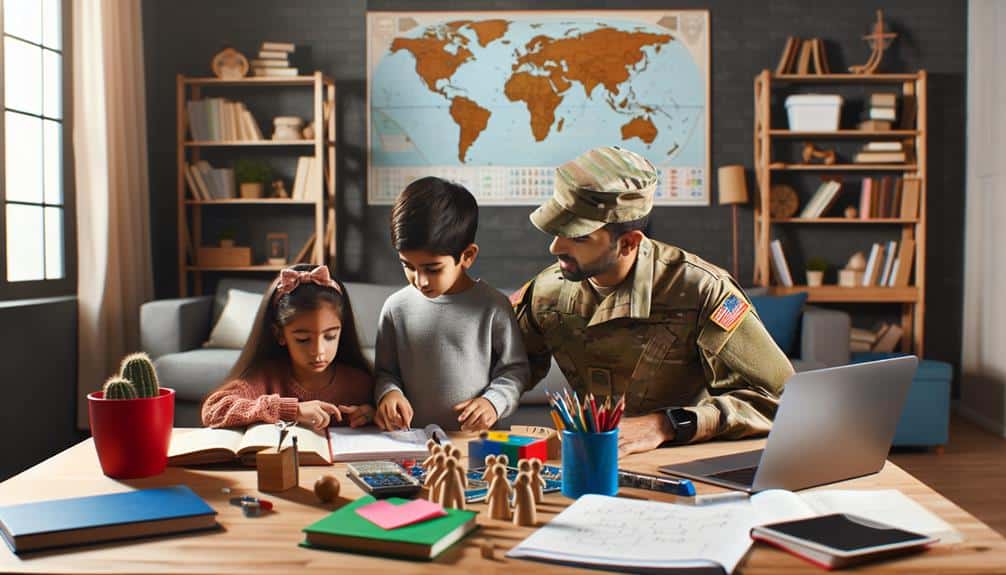Handling homeschooling in crises as a military family may feel overwhelming, but you're not alone. Make a detailed plan with evacuation routes and practice them. Keep essential numbers handy and pack an emergency kit. Prioritize tasks daily, take breaks, and accept the unpredictable. Utilize online platforms like Khan Academy for educational resources. Stay connected with other military families for support. Encourage physical activity for health and well-being. Establish routines, practice self-care, and limit media exposure to reduce stress. Remember, you have a strong support system and resources to help you through this challenging time.
Key Points
- Establish a detailed emergency plan with communication strategies.
- Prioritize essential tasks and incorporate breaks in your daily routine.
- Utilize online resources like Khan Academy for educational support.
- Connect with other military families for emotional support and resources.
- Incorporate physical activities like family dance parties for well-being.
Emergency Preparedness
Prepare your family for unexpected emergencies by creating a detailed plan that includes communication strategies, evacuation routes, and essential supplies. It's important to sit down with your loved ones and discuss what to do in case of a crisis. Start by identifying safe meeting points both inside and outside your home. Make sure everyone knows important contact numbers and establish a communication plan in case you get separated.
Practice your evacuation routes so that everyone is familiar with the procedures.
When putting together your emergency kit, think about essential items like water, non-perishable food, medications, and important documents. Tailor your supplies to meet your family's specific needs, including any pets you have. Keep your kit in a designated, easy-to-reach place that everyone knows about. Remember to check and update it regularly.
Being prepared can help alleviate some of the stress and uncertainty during emergencies. By having a solid plan in place, you can focus on keeping your family safe and secure.
Creating Flexible Schedules
When managing the challenges of homeschooling during a crisis, remember the importance of creating flexible schedules. Daily routine variations allow for adaptability.
Balancing work and school becomes more manageable, and adjusting to disruptions becomes a key skill to cultivate. Embrace the fluidity of your schedule to accommodate unexpected changes and maintain a sense of structure during uncertain times.
Daily Routine Variations
During times of crisis, adapting your daily routine to create flexible schedules can help military families homeschooling navigate the challenges more effectively. Finding a balance between structure and flexibility is key to ensuring a successful homeschooling experience for both you and your children.
Here are some tips to help you create daily routine variations that work for your family:
- Prioritize Essential Tasks: Identify the most important tasks for each day and focus on completing those first.
- Allow for Breaks: Incorporate short breaks in between study sessions to prevent burnout and keep motivation high.
- Embrace Unpredictability: Understand that unexpected events may disrupt your schedule, and be prepared to adjust accordingly.
Balancing Work and School
Finding a balance between your work responsibilities and your children's schooling is essential to maintain a harmonious and effective routine during times of crisis. Creating flexible schedules can help you manage both aspects efficiently.
Start by identifying peak productivity hours for work tasks and aligning them with your children's independent learning periods. This alignment can allow you to focus on work while your kids engage in self-directed activities. Additionally, consider breaking up the school day into shorter, focused sessions interspersed with breaks to accommodate your work demands.
It's important to communicate openly with your employer about your situation as a military family homeschooling during a crisis. Many companies are understanding and may offer flexible work arrangements to support you.
Remember that it's okay to ask for help from your spouse, older children, or extended family members to share the homeschooling responsibilities. By working together and adapting as needed, you can create a balanced routine that meets both your work and educational commitments.
Adjusting to Disruptions
To navigate disruptions effectively, consider crafting adaptable schedules that cater to both your work commitments and your children's homeschooling needs. Adjusting to unexpected changes can be challenging, but with a flexible routine in place, you can help maintain a sense of normalcy and productivity.
Here are some tips to assist you in creating schedules that work for your unique situation:
- Prioritize Tasks: Identify the most critical tasks for both work and homeschooling to focus on during disruptions.
- Embrace Flexibility: Allow for changes in your schedule and be open to adjusting as needed to accommodate unforeseen circumstances.
- Communication is Key: Keep open lines of communication with your family members about the schedule, ensuring everyone is on the same page and understands each other's commitments.
Utilizing Online Resources
Consider incorporating online resources into your homeschooling routine to enhance your child's learning experience during this challenging time as a military family. Online platforms can offer a wide range of educational materials, interactive lessons, and virtual field trips that can bring excitement and new perspectives to your child's learning journey.
Websites like Khan Academy, Scholastic Learn at Home, and National Geographic Kids provide engaging content across various subjects.
Additionally, virtual tutoring services can offer personalized support to address your child's specific learning needs. Many online platforms also offer tools for tracking progress and setting educational goals, empowering you to monitor your child's development closely.
Utilizing educational apps and online games can make learning fun and interactive for your child, helping them stay engaged and motivated.
Remember to explore free resources and discounts that may be available to military families. By integrating online resources into your homeschooling routine, you can supplement your curriculum, spark curiosity, and create a dynamic learning environment for your child during this challenging period.
Staying Connected With Support Groups
In times of crisis, connecting with support groups can be a valuable lifeline for military families facing the challenges of homeschooling. Being part of a supportive community can provide you with emotional encouragement, practical tips, and a sense of solidarity in managing these uncertain times.
Here are three ways staying connected with support groups can benefit you:
- Emotional Support: Interacting with other military families who understand the unique struggles you face can offer a safe space to express your feelings and find comfort in shared experiences.
- Resource Sharing: Support groups often serve as a hub for sharing resources, such as educational materials, online learning tools, and homeschooling strategies that have worked well for others in similar situations.
- Networking Opportunities: Engaging with a support group can open doors to valuable connections within the military community, leading to potential collaborations, mentorships, and friendships that can enrich your homeschooling journey.
Incorporating Physical Activity
It's essential to keep your family moving, even during challenging times.
Physical activity can boost mood, energy levels, and overall well-being.
Let's explore some fun fitness activities and indoor exercise ideas to keep everyone active and healthy.
Importance of Movement
Incorporating regular physical activity into your homeschool routine is essential for maintaining both physical health and mental well-being during times of crisis. Movement not only keeps your body active but also plays a significant role in boosting your mood and reducing stress levels.
Here are a few reasons why prioritizing movement is critical for you and your family:
- Physical Health: Engaging in physical activity helps in strengthening muscles, improving cardiovascular health, and maintaining a healthy weight.
- Mental Well-being: Exercise releases endorphins, the feel-good hormones, which can help combat feelings of anxiety and depression.
- Focus and Productivity: Physical activity can enhance focus and cognitive function, leading to improved productivity in both homeschooling and daily tasks.
Fun Fitness Activities
Consider adding a variety of fun fitness activities to your daily routine to make physical activity engaging and enjoyable for your family during this challenging time. Incorporating fun fitness activities not only promotes physical health but also boosts mood and energy levels.
You could try organizing family dance parties, setting up obstacle courses in your backyard, or going for nature walks together. These activities not only provide exercise but also create lasting memories for your family.
Engaging in fun fitness activities can help break up the monotony of the day and provide a much-needed energy boost. Additionally, it can be a great way to bond as a family and relieve stress.
Encouraging your children to be active in a fun and enjoyable manner sets a positive example for them to lead a healthy lifestyle even during challenging times.
Indoor Exercise Ideas
To maintain your family physically active while indoors, try engaging in a variety of exercise ideas that promote movement and fun. During these challenging times, it's crucial to find ways to stay active and energized within the confines of your home. Here are some indoor exercise ideas to help keep your family moving and healthy:
- Dance Party: Put on your favorite music and have a spontaneous dance party in the living room. Dancing is a fantastic way to get your heart rate up and have a blast with your loved ones.
- Obstacle Course: Create an indoor obstacle course using pillows, chairs, and other household items. This activity not only promotes physical movement but also encourages creativity and problem-solving skills.
- Yoga Session: Unwind and stretch with a family yoga session. Yoga is great for relaxation, flexibility, and strength. There are many online resources offering family-friendly yoga routines to follow along.
Managing Stress and Anxiety
In times of crisis, it's important to prioritize managing stress and anxiety as a military family homeschooling your children. As you navigate through the challenges of balancing homeschooling with the demands of military life, it's normal to feel overwhelmed at times.
Here are some practical tips to help you cope with stress and anxiety:
- Establish a Routine: Creating a daily schedule can provide structure and a sense of normalcy for both you and your children.
- Practice Self-Care: Remember to take care of yourself. Find time for activities you enjoy, get enough rest, and eat healthily.
- Stay Connected: Reach out to other military families facing similar challenges. Sharing experiences and offering support can be incredibly comforting.
- Mindfulness and Relaxation Techniques: Engage in activities like deep breathing, meditation, or yoga to help calm your mind and body.
- Limit Media Exposure: While it's important to stay informed, try to limit exposure to news that may increase your anxiety levels.
Seeking Professional Help if Needed
If you find yourself struggling to cope with stress and anxiety while homeschooling as a military family, remember that seeking professional help is a valuable option worth exploring. It's okay to reach out for support when you need it the most.
Here are some reasons why seeking professional help can be beneficial:
- Specialized Guidance: Professionals can offer specialized guidance tailored to your unique situation, providing strategies to manage stress and anxiety effectively.
- Emotional Support: Speaking with a professional can offer a safe space to express your feelings and concerns without judgment, helping you navigate through difficult emotions.
- Resource Access: Professionals have access to a variety of resources and tools that can assist you in developing coping mechanisms and enhancing your mental well-being.
Frequently Asked Questions
How Can Military Families Homeschool During Deployment?
During deployment, military families can homeschool by creating a flexible schedule that accommodates changes. Utilize online resources for continuity, engage in virtual support groups, and remember self-care. Stay connected with your deployed loved one for emotional support.
What Are Ways to Handle Homeschooling With Multiple Grade Levels?
Handling homeschooling with multiple grade levels can be challenging but manageable. Create a flexible schedule, utilize group activities, and encourage older kids to help younger ones. Stay organized, communicate openly, and remember to be patient with yourself.
Are There Specific Resources for Teaching Military History?
If you're looking for resources on teaching military history, there are plenty available online, from documentaries to educational websites. Engage together, explore stories of courage and sacrifice, and bring history to life.
How Can Military Families Access Mental Health Support?
You can access mental health support through various channels. Reach out to military family support programs, counseling services, or hotlines. Taking care of your mental well-being is essential, and there are resources available to help you.
What Strategies Help Children Cope With Frequent Moves?
Moving frequently can be tough, but remember to stay positive. Keep open communication with your family. Create routines to provide stability. Encourage kids to express their feelings. Help them stay connected with friends and loved ones.



